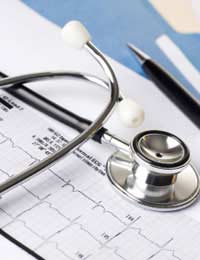What Are Electrophysiological Tests?

The heart beats without us consciously telling it what to do and the rhythm of the heart maintains itself over the course of sometimes a century of life. When something goes wrong with the electrical control circuits that make regular heart beats possible, this can have very serious effects on health. Listening to the heart, or visualising it using imaging technology can detect some problems such as faulty heart valves or blocked blood vessels but problems in these electrical control circuits can only be detected using electrophysiological tests.
These tests allow doctors to follow the way that electrical activity spreads through the heart muscle, comparing it with the normal patterns seen in healthy hearts. They can detect abnormal rhythms before they have a chance to become dangerous.
What does Having and Electrophysiological Test Involve?
The tests do not require surgery but they are referred to as invasive diagnostic tests. You will be asked not to have anything to eat or drink for several hours beforehand, as sometimes the effect of the test can make your heart experience strange rhythms and this can make you feel dizzy and sick. Having an empty stomach is best if you are anxious as you may be given a sedative to make you feel relaxed and a bit drowsy while you are having the test.When you go into the treatment room, you will have numbing injections in your upper thigh or groin, at the point in your main veins where needles and thin catheters will be inserted. This fine, flexible tubes are gently pushed through your main veins until they reach the heart. Each one has an electrode at the tip and, once these are in place in different parts of your heart, they can be stimulated to make the heart beat in different ways.
How are Test Results Obtained?
During the test you will be hooked up to an electrocardiogram machine with a real-time display and printout so that the doctors doing the test can see what is happening then and there and can also record the traces of your heart for more detailed analysis later.How Do You Feel During an Electrophysiological Test?
Most people do feel anxious, that is why a sedative is often given but many people have the test every year without any problems. You may experience some strange sensations in your chest as the catheters with the electrical stimulators are pushed into place, but then you will not be aware of them. You may feel as though you are having palpitations during the tests and it is normal for your heart to show some abnormal beat rhythms. Nursing staff and doctors are on hand though and you should say immediately if you do start to feel very ill, or you start to have chest pains.After the catheters are removed, there may be some slight bleeding from the entry points and you will be allowed to rest in a bed for a couple of hours before you go home. Most electrophysiological tests are done as a day case procedure, so you should be OK to go home afterwards. Be sure not to drive yourself though.
You will probably feel tired by the experience, but you should not experience any bad after effects.


Re: What are Statins?
Kak esehiko sminor k112 cardiacmatters.co.uk
Re: Laser Surgery for Coronary Artery Disease
I was diagnosed with Idiopathic Pulmonary Fibrosis (IPF) four years ago. For over two years, I relied on…
Re: Coronary Angioplasty Surgery
My husband had a stent put in at the beginning of January. It was done at a government hospital and the doctors appointment is…
Re: Hole in the Heart: What Happens Next?
I was just in hospital with left side pain and numbness was diagnosed with hole in heart I’m home now and I’m having…
Re: Hole in the Heart: What Happens Next?
Ok I'm 61 yes old.ive been in 3 motorcycle wrecks,I have sticky platelets I've been hospitalized 3:times with blood…
Re: Why Does My Heart Beat Faster After Sweet Food?
The coffee doesn't make a heart beat faster. Caffeine makes the hart beat harder/stronger. The sugar…
Re: Hole in the Heart: What Happens Next?
Hi Doctor, My friend is having 35 years and he is having a hole in the heart, he consulted many doctors in USA and…
Re: What is Heart Block?
Hello. I have born first degree heart block. 10 years ago was temporarily changing to 2 degrees, but stay first degree. Am I at high risk…
Re: Hole in the Heart: What Happens Next?
In Sept '16 I was diagnosed with hypertension (high blood pressure) and in May '17 I had a stroke - the only symptoms…
Re: Hole in the Heart: What Happens Next?
Hi Iam 53 years old and living very healthy life. I have blood pressure but it is in normal condition with proper…